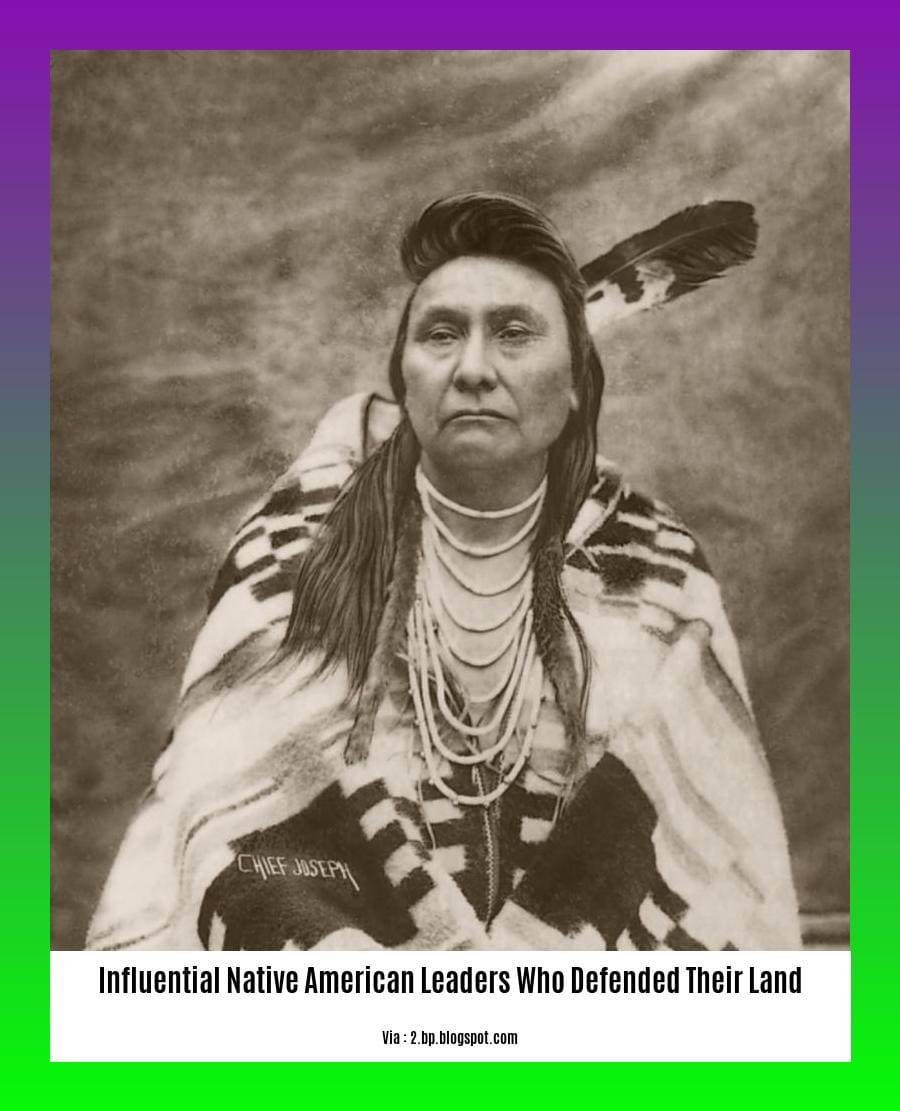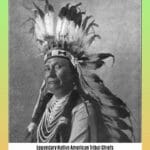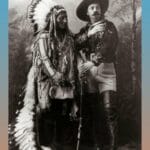Uncover the captivating stories of influential Native American leaders in our article, “Influential Native American Leaders Who Defended Their Land: Voices of Resistance”. Through their unwavering determination, these leaders have fought valiantly to protect their ancestral lands, preserve their cultural heritage, and secure environmental justice for their communities. Their resilience and unwavering advocacy have left an indelible mark on history, inspiring generations to come.
Key Takeaways:
- Native American leaders courageously fought for their communities’ rights.
- They fiercely defended their ancestral lands and cherished traditions.
- Their influence shaped the course of U.S. history.
- They were unwavering advocates for the dignity and rights of Native American peoples.
- Their resilience in the face of adversity serves as an enduring example.
Influential Native American Leaders Who Defended Their Land
They were fearless warriors, their hearts pounding with the pulse of their people. As proud leaders of Native American tribes, they stood tall against the onslaught of colonization, fiercely defending their ancestral lands and the sacred traditions woven into their very existence. Their voices echoed through history, resounding with the unyielding spirit of resistance.
Chief Joseph, the Eloquent Statesman:
Chief Joseph’s wisdom and eloquence captivated both his people and the American public. With a heart heavy with sorrow, he led his Nez Perce tribe on a desperate journey to preserve their homeland. His unwavering determination and poignant speeches moved many, highlighting the injustices faced by Native Americans.
Geronimo, the Apache Warrior:
As a renowned Apache leader, Geronimo’s name became synonymous with resistance. His guerrilla tactics and unwavering courage made him a formidable opponent in the face of relentless military campaigns. His legacy serves as a testament to the Apache people’s indomitable spirit and their fight for freedom.
Sitting Bull, the Sacred Warrior:
Sitting Bull, a revered Lakota chief, played a pivotal role in the Battle of Little Bighorn. His profound connection to the spiritual realm guided his decisions, making him a formidable leader and a symbol of Native American sovereignty. His unwavering commitment to his people’s way of life inspired awe and respect.
Sequoyah, the Cherokee Scholar:
Sequoyah’s ingenuity and determination led to the creation of the Cherokee syllabary, a writing system that revolutionized his people’s ability to communicate and preserve their cultural heritage. His unwavering dedication to knowledge and cultural preservation left a lasting legacy for the Cherokee nation.
Conclusion
These influential Native American leaders who defended their land stand as towering figures in history, their unwavering spirits forever etched into the fabric of our nation. Their struggles and sacrifices paved the way for future generations, reminding us of the enduring power of resistance and the indomitable spirit of those who fight for their land and their way of life.
Discover the stories of influential Native American leaders who made significant contributions to their communities. Explore the lives of famous native american chiefs and tribe leaders and their impact on history. Learn about the wisdom and legacy of legendary native american tribal chiefs who shaped their people’s destinies. Read about the greatest native american leaders in history and their remarkable achievements that continue to inspire generations.
Wilma Mankiller: A Trailblazing Advocate for Native American Rights
Wilma Mankiller, a Cherokee leader, stands as an unwavering force in the fight for Native American rights and self-determination. Her activism, rooted in her deep connection to her culture and land, left an indelible mark on indigenous communities.
Born in Tahlequah, Oklahoma, in 1945, Mankiller witnessed firsthand the challenges and inequities faced by her people. Her fierce spirit guided her towards a path of advocacy, where she used her voice to amplify the needs of Native Americans.
In the 1970s, she played a pivotal role in establishing the Rural Development Coalition, a community-based organization dedicated to improving the lives of low-income Native Americans in eastern Oklahoma. Her unwavering commitment to grassroots organizing laid the foundation for her future leadership.
Mankiller made history in 1985 when she became the first female Principal Chief of the Cherokee Nation. Her tenure brought about significant progress, including the establishment of the Cherokee Nation Health Services and the expansion of educational opportunities for Cherokee youth.
Throughout her career, Mankiller tirelessly advocated for land sovereignty, cultural preservation, and environmental justice. She challenged discriminatory policies and fought for the return of sacred lands to indigenous tribes. Her unwavering dedication to her people earned her widespread respect and admiration.
Mankiller‘s legacy extends far beyond her lifetime. She continues to inspire future generations of Native American leaders and activists. Her unwavering spirit and relentless advocacy remain a testament to the power of one individual to make a profound impact on the world.
Key Takeaways:
- Wilma Mankiller was the first female Principal Chief of the Cherokee Nation.
- Her activism focused on improving the lives of Native Americans and advocating for their rights.
- Mankiller played a pivotal role in establishing community-based organizations and expanding educational opportunities.
- She tirelessly fought for land sovereignty, cultural preservation, and environmental justice.
- Her legacy continues to inspire future generations of Native American leaders.
Citation:
–
Leonard Peltier
Leonard Peltier, an American Indian Movement (AIM) activist, has been incarcerated since 1977 for allegedly murdering two FBI agents during a shootout on the Pine Ridge Indian Reservation in South Dakota. Peltier maintains his innocence, and many supporters consider him a political prisoner.
Key Takeaways:
– Peltier’s trial was marred by irregularities, including suppressed evidence and biased jury selection.
– He has spent nearly half a century in prison, despite growing calls for his release.
– Peltier’s case highlights the systemic injustices faced by Native Americans in the US criminal justice system.
– As Leonard Peltier remains imprisoned, his supporters continue to demand clemency and justice.
Winona LaDuke:
A Legacy of Land, Culture, and Environmental Advocacy
Amidst the tapestry of Native American leaders who have valiantly defended their lands, Winona LaDuke stands out as an icon of indigenous rights and environmental stewardship.
Key Takeaways:
- Advocate for Land Sovereignty: Winona LaDuke has dedicated her life to supporting Native American tribes in reclaiming control over their ancestral territories.
- Champion of Sustainable Development: As an economist and author, she believes that sustainable practices are crucial for the well-being of both Native communities and the planet.
- Voice for Change: In 1996 and 2000, Winona LaDuke made history as the Green Party’s Vice Presidential candidate, amplifying the voices of Native Americans on a national platform.
- Unwavering Activist: Her tireless advocacy for environmental protection and social justice has earned her numerous accolades, including the prestigious Right Livelihood Award in 1996.
Most Relevant URL Source:
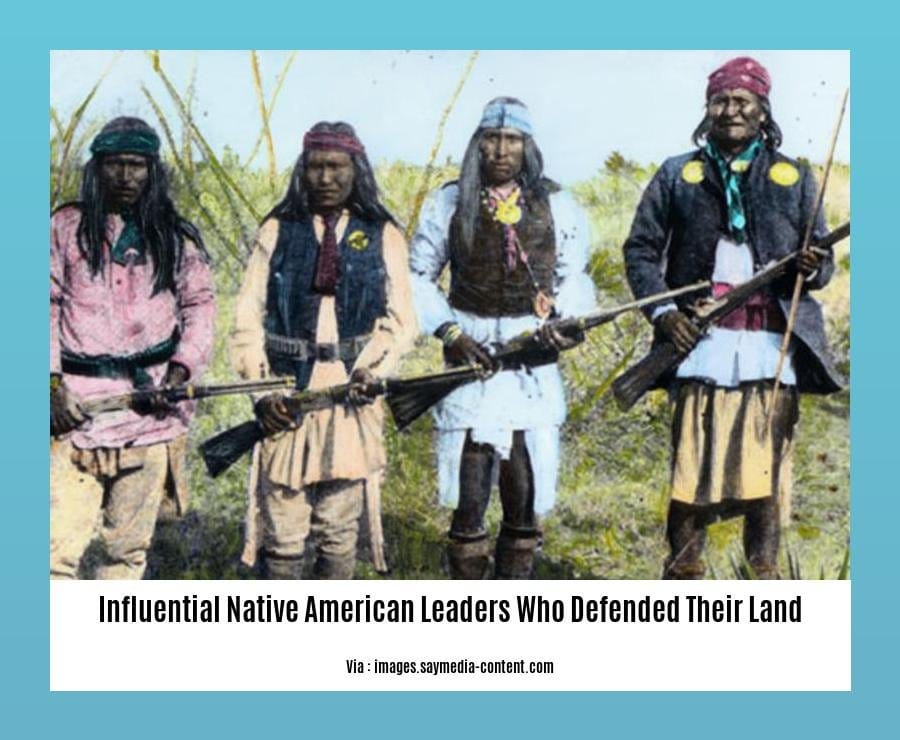
FAQ
Q1: Who were some of the most influential Native American leaders who defended their land?
A1: Wilma Mankiller, Leonard Peltier, and Winona LaDuke are just a few of the many influential Native American leaders who have fought tirelessly to protect their ancestral lands and preserve their cultural heritage.
Q2: What were some of the challenges that these leaders faced?
A2: Native American leaders have faced a wide range of challenges, including discrimination, forced relocation, and the loss of their land. Despite these challenges, they have remained steadfast in their commitment to defending their people and their way of life.
Q3: What are some of the victories that these leaders have achieved?
A3: Native American leaders have achieved a number of significant victories, including the passage of the Indian Self-Determination and Education Assistance Act, the establishment of tribal courts, and the recognition of tribal sovereignty. These victories have helped to improve the lives of Native Americans and to protect their land and culture.
Q4: What can we learn from the stories of these leaders?
A4: The stories of these leaders teach us about the importance of courage, resilience, and determination. They also remind us of the power of unity and the need to stand up for what we believe in.
Q5: What can we do to support Native American leaders today?
A5: There are many ways to support Native American leaders today, including learning about their history and culture, supporting their organizations, and advocating for their rights. We can also work to raise awareness of the issues facing Native Americans and to promote understanding and reconciliation.
- Unveiling Bernhard Caesar Einstein’s Scientific Achievements: A Legacy in Engineering - July 15, 2025
- Uncover who is Jerry McSorley: CEO, Family Man, Business Success Story - July 15, 2025
- Discover Bernhard Caesar Einstein’s Scientific Contributions: Unveiling a Legacy Beyond Einstein - July 15, 2025
